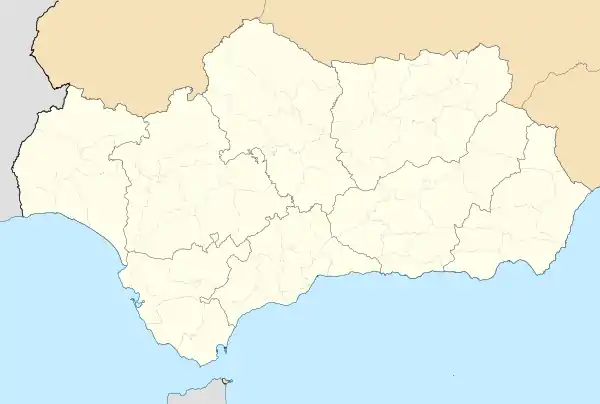Alboran Island
Alboran Island (Spanish: Isla de Alborán) is a small islet of Spain (province of Almería) in the Alboran Sea, part of the western Mediterranean Sea, about 56 kilometres (35 mi; 30 nmi) north of the Moroccan coast and 85 kilometres (53 mi; 46 nmi) from the Spanish mainland. The main buildings are an automated lighthouse built in the 19th century, a small cemetery, and a harbor.
 | |
 Alborán Location of Alborán Island in Spain  Alborán Location of Alborán Island in Andalusia | |
| Geography | |
|---|---|
| Location | Alboran Sea |
| Coordinates | 35°56′22″N 03°02′07″W |
| Area | 0.07 km2 (0.027 sq mi) |
| Highest elevation | 15 m (49 ft) |
| Administration | |
| Province | Province of Almería |
| Municipality | Almería |
| Demographics | |
| Population | military staff only |
Description
The island is a flat platform about 15 metres (49 feet) above sea level and about 71,200 m2 (17.6 acres; 7.1 ha) in area. 100 m (328 ft) off the northeastern end of the island is the small islote de La Nube (literally, islet of the cloud).
Natural history
Alboran has a volcanic origin, located in an important seismic zone where the African plate collides with the Eurasian plate. In 1899 a new igneous rock was discovered on Alboran, with the name of alboranite, in honor of the island.
The islet has been recognised as an Important Bird Area (IBA) by BirdLife International because it supports a breeding population of Audouin's gulls, as well as various species of passerines on migration.[1]
The wall-rocket species Diplotaxis siettiana, called jaramago de Alborán in Spanish, has its only known wild population on the island. It was extinct there during much of the late 20th century but successfully reintroduced from ex-situ conservation stocks in 1999.
In 2001, the United Nations declared the island and its seabed a Specially Protected Area of Mediterranean Importance.
History
The island became a power base of Mustafa ben Yusuf al Mahmud ed Din (Arabic: مصطفى بن يوسف المحمود الدين), a Tunisian corsair in the Ottoman sultan's service whose attacks were so ferocious that he became known as Al-Borani (hence the island's name), from the Turkish for "thunderstorm". It became a Spanish possession after the Battle of Alboran in 1540.[2]
Alborán has been known in error as "Albusama".[3]
The aristocrat Archduke Ludwig Salvator of Austria visited the island and published in 1899 an illustrated book about the island in German.[4][5]
In 1963, the Spanish army established a permanent detachment of Spanish Navy Marines for the control and protection of the island.[2]
Administration
The island has belonged to the municipality of Almería since the 19th century.
References
- "Alborán island". BirdLife Data Zone. BirdLife International. 2021. Retrieved 12 February 2021.
- Gutiérrez Castillo, Víctor Luis (2003). "Análisis histórico-jurídico de la isla andaluza de Alborán". Revista Electrónica de Estudios Internacionales (6): 2. ISSN 1697-5197.
- "Algunos cartógrafos de los últimos siglos han dado a Alboran el nombre de Albusama, confundiéndola con el pequeño islote costero cercano a la ciudad llamada tambien por ellos Albusama." (Marie Armand Pascal d'Avezac de Castera-Macaya, 1846. Historia de las islas de África p. 386); "Alhucema (Albusama): Pequeña isla del Mediterráneo , sobre la costa del reyno de Fez , en frente de la de Alhucema." (Antonio Vegas 1806. Diccionário geográfico universal, que comprende la descripción de las quatro partes del mundo, s.v. "Alhucema").
- Salvator, Ludwig; Woerl, Leo (1899). Erzherzog Ludwig Salvator aus dem Oesterreichischen Kaiserhause als Forscher des Mittelmeers (in German). Woerls Reisebucher-Verlag.
- "Alboran". www.ludwigsalvator.com. Archived from the original on 2021-04-15. Retrieved 2021-02-26.